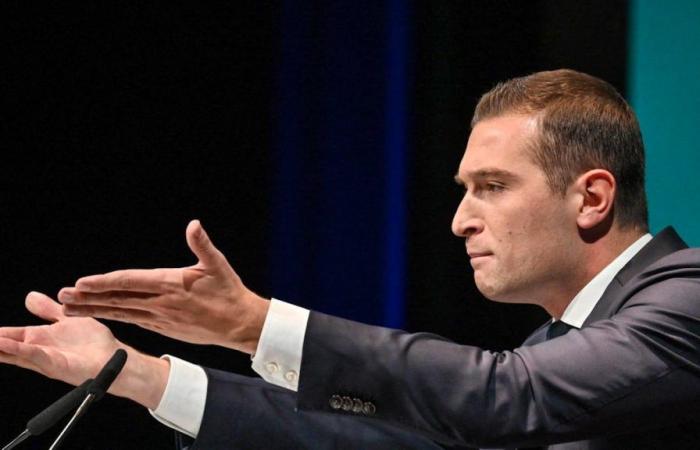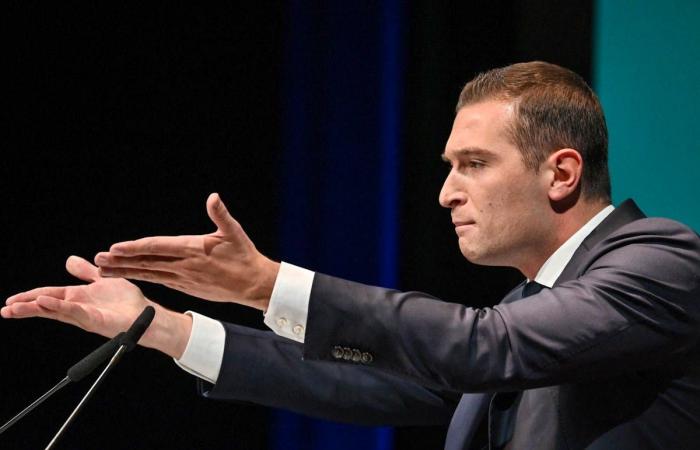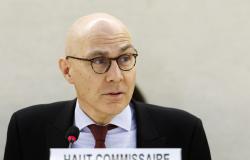Jordan Bardella had declared before the first round that he would not go to Matignon without an absolute majority.
AFP
After the unprecedented score of the RN in the first round, the withdrawals between the left and Macronie are being put in place, not without hitches, to prevent the extreme right from having an absolute majority on the evening of July 7 and possibly consider a “grand coalition” instead.
The candidates still in the running have until Tuesday 6 p.m. to decide to withdraw and thus radically reduce the potential number of triangulars, more than 300 due to the high participation in the first round (66.7%).
On Sunday, the navy blue wave swept through with more than 10.6 million votes, or 33.1% of the vote, a historic level – excluding the second round of the 2022 presidential election.
The RN has struck a major blow, by electing 39 deputies, starting with Marine Le Pen in Pas-de-Calais. The party with the flame, allied with Eric Ciotti, qualified in 443 of the 577 constituencies and is in the lead in 296 of them.
With 27.99%, the New Popular Front already has 32 elected officials. But he lost the communist Fabien Roussel, swept away by the RN tidal wave in the North. Another of its headliners, François Ruffin, is on difficult ballot in the Somme even with the withdrawal of the Macronist candidate.
The outgoing majority takes stock after its defeat (20.8% of the vote). If Gabriel Attal is one of around ten ministers likely to win on Sunday, four others are off to a bad start, and three (Sabrina Agresti-Roubache, Marie Guévenoux and Fadila Khattabi) have already announced their withdrawal.
Dilemma
To discuss these withdrawals, Emmanuel Macron, who called on Sunday for a “large, clearly democratic and republican gathering”, summoned his ministers to the Elysée on Monday noon.
While several Renaissance candidates who came third have already announced their withdrawal, such as Sylvie Casenave-Péré, who came third behind Marie-Caroline Le Pen in Sarthe, some intend to stay, believing either that they have more reserves of votes than the left, or that their withdrawal would favour the RN, such as Loïc Signor in Val-de-Marne.
And the outgoing majority struggles to speak with one voice when it comes to supporting an LFI candidate between those who, like Edouard Philippe or Bruno Le Maire, want “neither the RN nor the LFI”, those who take it “on a case-by-case basis” like the outgoing President of the Assembly Yaël Braun-Pivet and those who, on the left wing, do not set conditions.
Rather than the “disastrous project” of the RN, this is the line defended by Gabriel Attal, who will meet Monday afternoon with the candidates by videoconference. However, he estimated on Sunday that the presidential camp will constitute “the best choice to prevent the RN from having an absolute majority”.
On the New Popular Front side, the parties have already instructed their candidate in third position to withdraw, with one difference however for LFI for whom this rule only applies in cases where the RN is in the lead.
The rebellious candidate thus withdrew in favor of former Prime Minister Elisabeth Borne, second behind the RN in Calvados.
But he is holding on, for example, in the constituency of Gérald Darmanin, who narrowly beat the RN. Conversely, an environmentalist candidate withdrew in Haute-Loire to favour Laurent Wauquiez (LR), who is only two points ahead of the RN.
When they have the opportunity, the LR have instead chosen to maintain their position, like Maxime Minot, who came third behind the left and the RN in the Oise.
Relative majority or grand coalition
As it stands, projections from polling institutes anticipate a large relative majority of at least 240 seats for Jordan Bardella’s troops, or even a narrow absolute majority of up to 295 seats.
But these projections are made before withdrawals.
“Even if voters do not mechanically follow the instructions of their political leaders, we will have an effect that will rather work against the RN,” commented the deputy general director of Ipsos Brice Teinturier. According to the political scientist, “the starting point is rather on a relative majority than an absolute majority.”
To counter a relative majority of the RN, several leaders of the current majority, such as Yaël Braun-Pivet, have already called for a “grand coalition” of communists in LR the day after July 7.
But the head of the Socialist Party Olivier Faure refused on Monday to be “the substitute for a majority in disarray”, setting out his conditions for a possible “majority of projects” of the “republican forces”, which Gabriel Attal called for on Sunday.
On the RN side, if Jordan Bardella had declared before the first round that he would not go to Matignon without an absolute majority, Sébastien Chenu seemed to qualify this position.
“We will have to look at the configuration of the National Assembly. If there is indeed support to be found, we will assume our responsibilities before the French people,” declared the vice-president of the RN.
On in power” or “the National Union”. If Jean-Luc Mélenchon said he agreed with a debate between the two parties, he ruled out his own participation, referring to the leaders of LFI.
The legislative elections have a great echo abroad. Polish Prime Minister Donald Tusk has expressed concern about “a dangerous trend” for Europe, evoking the context of a rise of the radical right in Europe and Russian influence within these parties.
(afp)







